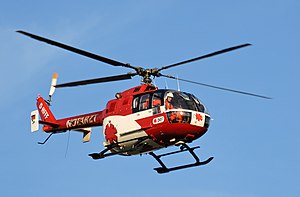MBB Bo.105
| Bo 105 | |
|---|---|
 |
|
| A German-registered Bo 105 | |
| Role | Light utility helicopter |
| Manufacturer | Messerschmitt-Bölkow-Blohm (MBB) |
| First flight | 16 February 1967 |
| Introduction | 1970 |
| Status | In service |
| Primary users |
German Army (retired) Indonesian Army Spanish Army Philippine Navy |
| Produced | 1967–2001 |
| Number built | 1,500+ |
| Unit cost |
$354,700 (1975)
$1.86 million (1991) |
| Developed into |
MBB/Kawasaki BK 117 Eurocopter EC135 |
|
|
|
|
|
The Messerschmitt-Bölkow-Blohm Bo 105 is a light, twin-engine, multi-purpose helicopter developed by Bölkow of Ottobrunn, Germany. It holds the distinction of being the first light twin-engine helicopter in the world, and is the first rotorcraft that could perform aerobatic maneuvers, such as inverted loops. The Bo 105 features a revolutionary hingeless rotor system, at that time a pioneering innovation in helicopters when it was introduced into service in 1970. Production of the Bo 105 began at the then-recently merged Messerschmitt-Bölkow-Blohm (MBB).
The main production facilities for producing the Bo 105 were located in Germany and Canada; due to the level of export sales encountered, additional manufacturing lines were set up in Spain, Indonesia, and the Philippines. MBB became a part of Eurocopter in 1991, who continued production of the type until 2001. The Bo 105 was formally replaced in Eurocopter's product range by the newer Eurocopter EC135, which was itself a development of the Bo 105.
In 1964, development work began at Bölkow upon the helicopter that would become the Bo 105, although work on the hingeless rotor it would use had begun earlier. On 16 February 1967, the second Bo 105A prototype conducted its maiden flight at Ottobrunn in Germany; the first public demonstration was held in May 1967. The test program was broken down into stages as the Bo 105 comprised a new airframe, new rotor system, and a new engine; thus the flying Bo 105 prototype was initially equipped with a main rotor from Westland Helicopter's Scout rotorcraft and a pair of Allison Model 250 turboshaft engines instead of their production counterparts.Sud Aviation worked with Bölkow on developing the rotorcraft; an Alouette II helicopter was modified with the Bo 105's rotor and used to test its performance envelope. The third Bo 105 prototype was equipped with the initial production standard MAN Turbo 6022 turboshaft engines; a total of six pre-production Bo 105s were constructed for testing.
...
Wikipedia
